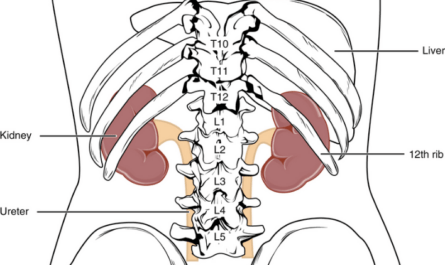Intercostal muscle strain is a common injury that affects many people, especially athletes, musicians, and those who perform repetitive motions. The intercostal muscles are located between the ribs and play a crucial role in breathing.
When these muscles become strained, it can cause immense discomfort and pain, making it difficult to perform even simple tasks. If left untreated, it can lead to more severe complications, such as respiratory problems. This article discusses the causes, symptoms, and treatment options for intercostal muscle strain.
What are Intercostal muscle strains?
The intercostal muscles comprise many groups: internal intercostal muscles, external intercostals, subcostal muscles, and transverse thoracic muscles. These muscles are located between the ribs.
Intercostal muscle strains occur when the muscles between the ribs are stretched or torn. These muscles help with breathing and are important for everyday activities such as laughing and coughing.
Symptoms of an intercostal muscle strain can include sharp pain when taking a deep breath, pain in the chest or back when laughing or coughing, and difficulty fully expanding the chest when taking a deep breath.
When the strain is mild or moderate, intercostal muscles commonly recover for 4 to 6 weeks with proper physiotherapy. However, severe intercostal muscle strain will require a longer period before it recovers fully.
Intercostal muscle strains have three gradings:
- Grade I Strain – A mild strain damages some muscle fibers. This usually heals within 2 to 3 weeks.
- Grade II Strain – A moderate muscle strain extensively damages the muscle fibers. The muscle in grade II strain is not fully ruptured and can heal within 3 to 6 weeks.
- Grade III Strain – This severe injury occurs when the muscle is wholly damaged or ruptured. It usually requires a surgical repair. Grade III strain can heal up to 3 months.

Symptoms of Intercostal Muscle Strain
Intercostal muscle strain can manifest through various symptoms, which may vary in intensity depending on the severity of the injury. Common symptoms of intercostal muscle strain include:
- Localized Pain: The primary symptom of intercostal muscle strain is localized pain between the ribs. The pain may worsen with movement, deep breathing, or coughing.
- Tenderness: The affected area may feel tender to the touch, indicating inflammation and muscle damage.
- Muscle Spasms: Intercostal muscle strain can cause involuntary muscle spasms, leading to further discomfort.
- Limited Range of Motion: Individuals with intercostal muscle strain may experience difficulty performing certain movements.
8 Common Causes of Intercostal Muscle Strain
These are the most common causes of intercostal muscle strain.
1. Sudden and Forceful Movements
Sudden and forceful movements, such as twisting, reaching, or lifting heavy objects, can place excessive stress on the intercostal muscles. These abrupt actions can strain or tear the muscles between the ribs, resulting in intense pain.
2. Poor Posture and Ergonomics
Maintaining poor posture and disregarding proper ergonomics during daily activities can increase the risk of intercostal muscle strain. Slouching, hunching over a desk, or sitting in an awkward position for extended periods can strain the muscles between the ribs and make them more susceptible to injury.
3. Repetitive Movements
Engaging in repetitive movements that involve the upper body, such as certain sports activities or occupational tasks, can contribute to intercostal muscle strain. The repetitive stress on the muscles can lead to overuse and subsequent strain or tearing.
4. Inadequate Warm-up and Stretching
Failing to warm up properly before physical activity or neglecting to stretch the intercostal muscles can increase the risk of strain. Without adequate preparation, the muscles may be less flexible and more prone to injury when subjected to sudden or strenuous movements.
5. Muscle Imbalance
Muscle imbalances occur when certain muscles become stronger or more dominant than their opposing muscles. In the case of intercostal muscle strain, an imbalance between the chest muscles (pectorals) and the back muscles (rhomboids and trapezius) can put excessive strain on the intercostal muscles, leading to injury.
6. Lack of Conditioning or Fitness
A lack of overall conditioning or fitness can make the intercostal muscles weaker and more susceptible to strain. Regular exercise targeting the core muscles, including the intercostals, is crucial for maintaining strength and flexibility.
7. Coughing and Sneezing
Forceful and repetitive coughing or sneezing episodes can strain the intercostal muscles. Individuals with respiratory conditions, such as bronchitis or allergies, may experience more frequent coughing or sneezing, increasing their risk of intercostal muscle strain.
8. Direct Trauma
Direct trauma, such as a blow to the chest or a fall, can cause intercostal muscle strain. The impact or force exerted on the muscles can lead to stretching or tearing, resulting in significant pain and discomfort.
10 Natural Remedies for Intercostal Muscle Strain
Here are how to treat mild to moderate intercostal muscle strain.
1. Rest
After an injury, rest your muscles and do not perform intense physical activities. Give your muscles enough time to recover completely. Do not twist your torso to protect your muscles from further injury.
2. Hot and Cold
The cold temperature of ice can reduce pain and swelling. Apply an ice pack as soon as possible for ten to twenty minutes. Do not apply direct ice to the skin.
Once the swelling disappears, you can use a heat compress on the area. Repeat this treatment three or more times daily to alleviate the inflammation quickly.
3. Brace or Splint the Area
Wrap or compress the area to decrease the swelling. Do not wrap it tightly, and ensure you loosen the bandage if it is too tight. Do this treatment during the first couple of days.
4. Therapeutic Exercise
Gentle stretching can strengthen the muscles, such as side bends with a bit of rotation. Get moving when the pain subsides. Not moving your body and muscles can increase the risk of further complications, such as muscle wasting, deep vein thrombosis, and chest infections.
Therapeutic exercises can restore mobility, strengthen the muscles, and improve the range of motion. It can also decrease the pressure on the neck, discs, and spinal joints.
5. Deep Breathing
Breathing can be painful due to chest and rib pain. This may result in pneumonia and can delay the healing process of the muscles due to a lack of oxygen. You will need to take deep breathing exercises to prevent this from happening.
- Slowly inhale and open the lungs as much as possible.
- Hold your breath for a few seconds.
- Exhale slowly.
Repeat these exercises once every hour to prevent pneumonia.
6. Pain Killers or Anti-inflammatory Drugs
Pain relievers can reduce inflammation and pain. One of the best is Paracetamol, which has minor side effects. Nonsteroidal Anti-inflammatory Drugs (NSAIDs) such as ibuprofen, aspirin, and naproxen are available over the counter.
Other NSAIDs for severe cases should be used only when prescribed by a doctor. Anti-inflammatories may delay healing during the first 2 to 3 days.
7. Physical Therapist
Help from a physical therapist can speed up the healing process of the muscles. They can also assist you in your exercises, providing soft tissue massage, joint mobilization, and gentle stretching to improve the spine’s range of motion, mobility, and alignment.
8. Neuromuscular Re-Education
Therapists use this technique to restore an individual’s normal movements. With neuromuscular re-education, you can improve your posture and learn the proper sitting, sleeping, and body mechanics to protect the injured parts of the body.
9. Epsom Salt Bath
Epsom salt is effective in alleviating muscular strains. It is composed of magnesium sulfate, which is a natural muscle relaxant. It can also alleviate both pain and swelling.
- Add 2 cups of Epsom salt to your warm bathwater.
- Soak your body in the water for at least thirty minutes.
- Repeat this treatment once a day until the strained muscle is recovered completely.
10. Tart Cherry Juice
Tart cherries are packed with antioxidants that can alleviate the pain and swelling of the strained muscle. It also contains high amounts of anti-inflammatory content that can deal with aches. Drink tart cherry juice once daily to improve your strength and alleviate pain and soreness.
5 Best Exercises for Intercostal Muscle Strain
1. Isometric Chest Wall Squeezes
This exercise is designed to strengthen your intercostal muscles while decreasing strain. To perform this exercise, begin by lying on your back on a flat surface with your knees bent and your feet flat on the ground.
Place your hands on your sides near your ribcage, and press your hands into your ribs. Squeeze your chest wall muscles for five to 10 seconds, then slowly relax for another five to 10 seconds. Repeat this 10 to 15 times for one set.
2. Diaphragmatic Breathing
Diaphragmatic breathing is an important exercise for intercostal muscle strain. To perform this exercise, lie on your back with your knees bent and feet flat on the ground.
Place one hand on your abdomen and the other on your chest. Inhale slowly and deeply through your nose, allowing your abdomen to expand. As you exhale, contract your abdominal muscles and draw your navel toward your spine. Repeat this 10 to 15 times for one set.
3. Chest Expansion
This exercise is designed to stretch the intercostal muscles and increase the range of motion in the chest. To perform this exercise, stand up straight with your feet shoulder-width apart.
Clasp your hands behind your back and slowly stretch your arms out to the sides. Hold this position for five to 10 seconds, then slowly relax your arms back to the starting position. Repeat this 10 to 15 times for one set.
4. Back Extensions
Back extensions are effective for strengthening the intercostal muscles and improving posture. To perform this exercise, begin by lying on your stomach on a flat surface with your arms extended to your sides.
Gently lift your upper body off the ground, and hold this position for five to 10 seconds. Slowly lower your body back down, and repeat this 10 to 15 times for one set.
5. Wall Push-Ups
This exercise is designed to strengthen the intercostal muscles while increasing your range of motion. Stand facing a wall with your feet shoulder-width apart to perform this exercise.
Place your hands flat against the wall, and slowly lower your body towards the wall until your chest is about six inches away. Hold this position for five to 10 seconds, then slowly push back up to the starting position. Repeat this 10 to 15 times for one set.
Frequently Asked Questions
1. Can intercostal muscle strain cause difficulty in breathing?
While intercostal muscle strain can cause pain and discomfort during breathing, it does not typically result in difficulty in breathing. However, if you experience severe shortness of breath or any respiratory distress, it is crucial to seek immediate medical attention, as it may indicate a more serious underlying condition.
2. How long does it take for intercostal muscle strain to heal?
The healing time for intercostal muscle strain varies depending on the severity of the injury. Mild strains may resolve within a few weeks with proper rest and conservative treatment. However, more severe strains may take several weeks or even months to heal completely.
3. Can intercostal muscle strain recur?
Yes, intercostal muscle strain can recur, especially if the underlying causes are not addressed. Identifying and addressing any muscle imbalances, weaknesses, or repetitive movements that may contribute to the strain is important to prevent recurrence.
4. Can I continue exercising with intercostal muscle strain?
It is essential to avoid activities that aggravate the pain and strain the intercostal muscles during the initial stages of the injury.
However, once the muscle has healed and the pain has subsided, gradually reintroducing exercises and physical activities under the guidance of a healthcare professional or physical therapist can help regain strength and prevent future injuries.
5. When should I seek medical attention for intercostal muscle strain?
If you experience severe or worsening pain, difficulty breathing, or if the pain persists for an extended period, it is advisable to seek medical attention.






